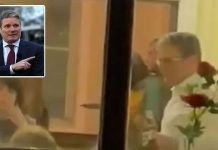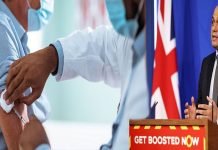Secondary pupils in England will have to wear masks in school corridors in local lockdown areas of England, after the government reversed its guidance.
Head teachers in any secondary school will also have the “flexibility” to introduce masks in their schools.
Education Secretary Gavin Williamson says it follows updated advice from the World Health Organization. But that advice is over three days old.
“At each stage we have listened to the latest medical and scientific advice,” said Mr Williamson.
The Department for Education says it is keeping its recommendation against using face coverings – but that schools can make their own decision to ask pupils and staff to wear them.
This will be in “communal areas” of schools such as corridors, rather than in classrooms, when schools “believe that is right in their particular circumstances”.
The government had been under pressure over face masks in England’s schools – with secondary schools in Scotland to use them in corridors or shared areas from next week.
Prime Minister Boris Johnson had earlier said: “We’ll look at the changing medical evidence as we go on, if we need to change the advice then of course we will.”
The ASCL headteachers’ union had warned of confusion about the rules over face coverings – and said there was a lack of clarity over how schools should respond if teachers or pupils wanted to wear masks.
They had said it would be “prudent” to reconsider guidance against using masks – in the light of a recent recommendation from the World Health Organization for over-12s to wear face masks.
The union’s leader, Geoff Barton, had urged that if there was a U-turn, that it should be “sooner rather than later”.
Despite the official guidance against face coverings, some schools had already been preparing to use them.
It was over 3 days ago that the world health organisation released information on children wearing masks. The government need to up its game a 3-day u-turn in the middle of a pandemic can have devastating consequences.
The World Health Organization (WHO) has issued guidance saying children over the age of 12 should wear masks, in line with recommended practice for adults in their country or area.
It admits little is known about how children transmit the virus but cites evidence that teenagers can infect others in the same way as adults.
Children aged five and under should not normally wear masks, the WHO said.
More than 800,000 people have now died with coronavirus worldwide.
At least 23 million cases of infection have been registered, according to Johns Hopkins University, with most of them recorded in the US, Brazil and India.
However the true number of people who have had the virus is believed to be far higher, due to insufficient testing and asymptomatic cases.
The numbers have been rising again in countries as diverse as South Korea, EU states and Lebanon.
For teachers, the WHO says: “In areas where there is widespread transmission, all adults under the age of 60 and who are in general good health should wear fabric masks when they cannot guarantee at least a one-metre distance from others.
“This is particularly important for adults working with children who may have close contact with children and one another.”
Adults aged 60 or over, or those with underlying health conditions, should wear medical masks, it says.
The WHO guidance does not specify whether a child over the age of 12 should wear a mask in school, but it may yet become a feature of the classroom as the new academic year begins.
France recently made it mandatory for all children over 11, and a number of schools in the UK have taken it upon themselves to require students to wear them even before this Tory U-turn on official government guidance.
Coronavirus pandemic: Children aged 12 and over should wear masks – WHO
WHO advises that people always consult and abide by local authorities on recommended practices in their area. An international and multidisciplinary expert group brought together by WHO reviewed evidence on COVID-19 disease and transmission in children and the limited available evidence on the use of masks by children.
Based on this and other factors such as childrens’ psychosocial needs and developmental milestones, WHO and UNICEF advise the following:
Children aged 5 years and under should not be required to wear masks. This is based on the safety and overall interest of the child and the capacity to appropriately use a mask with minimal assistance.
WHO and UNICEF advise that the decision to use masks for children aged 6-11 should be based on the following factors:
- Whether there is widespread transmission in the area where the child resides
- The ability of the child to safely and appropriately use a mask
- Access to masks, as well as laundering and replacement of masks in certain settings (such as schools and childcare services)
- Adequate adult supervision and instructions to the child on how to put on, take off and safely wear masks
- Potential impact of wearing a mask on learning and psychosocial development, in consultation with teachers, parents/caregivers and/or medical providers
- Specific settings and interactions the child has with other people who are at high risk of developing serious illness, such as the elderly and those with other underlying health conditions
WHO and UNICEF advise that children aged 12 and over should wear a mask under the same conditions as adults, in particular when they cannot guarantee at least a 1-metre distance from others and there is widespread transmission in the area.
More on the types of masks, how to choose them, and how to wear them is available here: https://www.who.int/emergencies/diseases/novel-coronavirus-2019/advice-for-public/when-and-how-to-use-masks
Support Independent Journalism Today
Our unwavering dedication is to provide you with unbiased news, diverse perspectives, and insightful opinions. We're on a mission to ensure that those in positions of power are held accountable for their actions, but we can't do it alone. Labour Heartlands is primarily funded by me, Paul Knaggs, and by the generous contributions of readers like you. Your donations keep us going and help us uphold the principles of independent journalism. Join us in our quest for truth, transparency, and accountability – donate today and be a part of our mission!
Like everyone else, we're facing challenges, and we need your help to stay online and continue providing crucial journalism. Every contribution, no matter how small, goes a long way in helping us thrive. By becoming one of our donors, you become a vital part of our mission to uncover the truth and uphold the values of democracy.
While we maintain our independence from political affiliations, we stand united against corruption, injustice, and the erosion of free speech, truth, and democracy. We believe in the power of accurate information in a democracy, and we consider facts non-negotiable.
Your support, no matter the amount, can make a significant impact. Together, we can make a difference and continue our journey toward a more informed and just society.
Thank you for supporting Labour Heartlands












